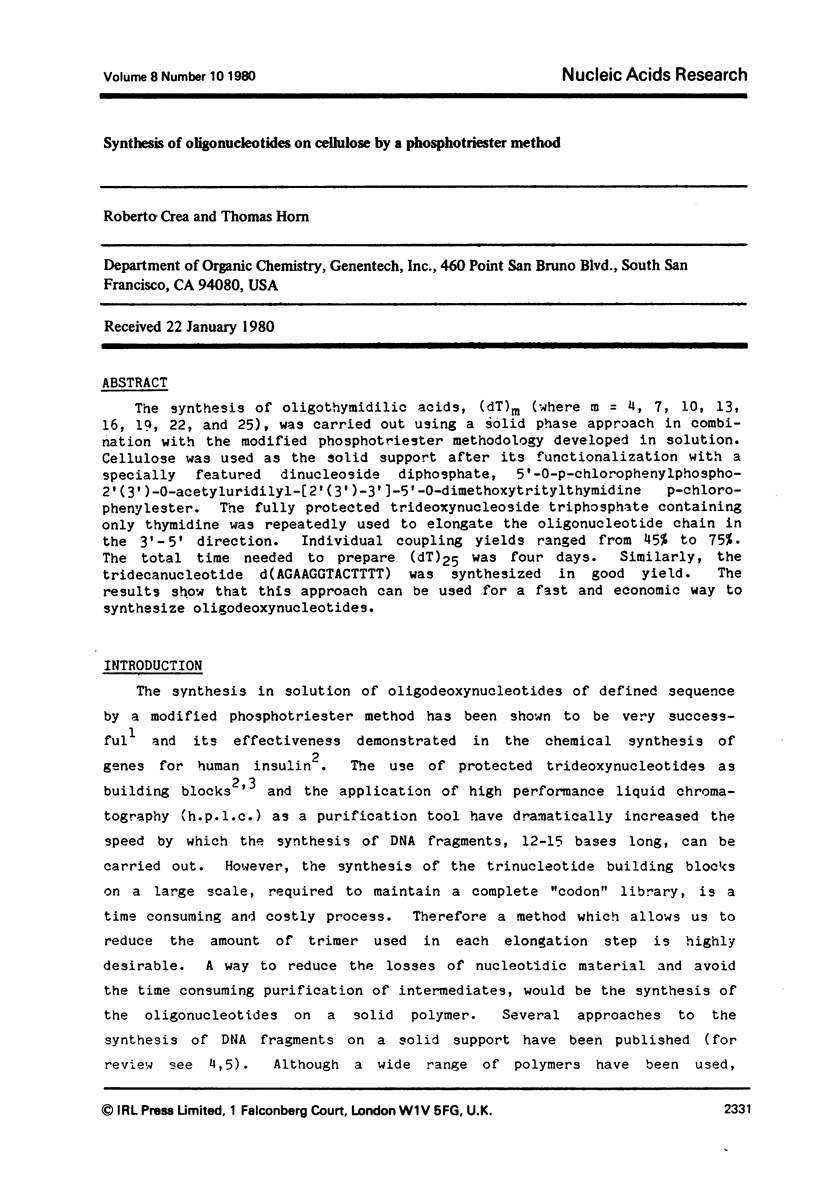Synthesis of oligonucleotides on cellulose by a phosphotriester method (original) (raw)
Abstract
The synthesis of oligothymidilic acids, (dT)m (where m = 4, 7, 10, 13, 16, 19, 22, and 25), was carried out using a solid phase approach in combination with the modified phosphotriester methodology developed in solution. Cellulose was used as the solid support after its functionalization with a specially featured dinucleoside diphosphate, 5'-0-p-chlorophenylphospho-2'(3')-0-acetyluridilyl-[2'(3')-3']-5'-0-dimethoxytritylthymidine p-chlorophenylester. The fully protected trideoxynucleoside triphosphate containing only thymidine was repeatedly used to elongate the oligonucleotide chain in the 3'-5' direction. Individual coupling yields ranged from 45% to 75%. The total time needed to prepare (dT)25 was four days. Similarly, the tridecanucleotide d(AGAAGGTACTTTT) was synthesized in good yield. The results show that this approach can be used for a fast and economic way to synthesize oligodeoxynucleotides.

Images in this article
Selected References
These references are in PubMed. This may not be the complete list of references from this article.
- Crea R., Kraszewski A., Hirose T., Itakura K. Chemical synthesis of genes for human insulin. Proc Natl Acad Sci U S A. 1978 Dec;75(12):5765–5769. doi: 10.1073/pnas.75.12.5765. [DOI] [PMC free article] [PubMed] [Google Scholar]
- Gait M. J., Sheppard R. C. Rapid synthesis of oligodeoxyribonucleotides: a new solid-phase method. Nucleic Acids Res. 1977 Apr;4(4):1135–1158. doi: 10.1093/nar/4.4.1135. [DOI] [PMC free article] [PubMed] [Google Scholar]
- Gait M. J., Singh M., Sheppard R. C., Edge M. D., Greene A. R., Heathcliffe G. R., Atkinson T. C., Newton C. R., Markham A. F. Rapid synthesis of oligodeoxyribonucleotides. IV. Improved solid phase synthesis of oligodeoxyribonucleotides through phosphotriester intermediates. Nucleic Acids Res. 1980 Mar 11;8(5):1081–1096. doi: 10.1093/nar/8.5.1081. [DOI] [PMC free article] [PubMed] [Google Scholar]
- Jay E., Bambara R., Padmanabhan R., Wu R. DNA sequence analysis: a general, simple and rapid method for sequencing large oligodeoxyribonucleotide fragments by mapping. Nucleic Acids Res. 1974 Mar;1(3):331–353. doi: 10.1093/nar/1.3.331. [DOI] [PMC free article] [PubMed] [Google Scholar]
- Kössel H. Recent advances in polynucleotide synthesis. Fortschr Chem Org Naturst. 1975;32:297–508. doi: 10.1007/978-3-7091-7083-0_6. [DOI] [PubMed] [Google Scholar]
- Pless R. C., Letsinger R. L. Solid support synthesis of oligothymidylates using phosphorochloridates and 1-alkylimidazoles. Nucleic Acids Res. 1975 Jun;2(6):773–786. doi: 10.1093/nar/2.6.773. [DOI] [PMC free article] [PubMed] [Google Scholar]
- Potapov V. K., Veiko V. P., Koroleva O. N., Shabarova Z. A. Rapid synthesis of oligodeoxyribonucleotides on a grafted polymer support. Nucleic Acids Res. 1979;6(6):2041–2056. doi: 10.1093/nar/6.6.2041. [DOI] [PMC free article] [PubMed] [Google Scholar]
- Reese C. B., Saffhill R., Sulston J. E. 4-methoxytetrahydropyran-4-yl. A symmetrical alternative to the tetrahydropyranyl protecting group. Tetrahedron. 1970 Feb;26(4):1023–1030. doi: 10.1016/s0040-4020(01)98779-4. [DOI] [PubMed] [Google Scholar]
- Stawinski J., Hozumi T., Narang S. A., Bahl C. P., Wu R. Arylsulfonyltetrazoles, new coupling reagents and further improvements in the triester method for the synthesis of deoxyribooligonucleotides. Nucleic Acids Res. 1977 Feb;4(2):353–371. doi: 10.1093/nar/4.2.353. [DOI] [PMC free article] [PubMed] [Google Scholar]